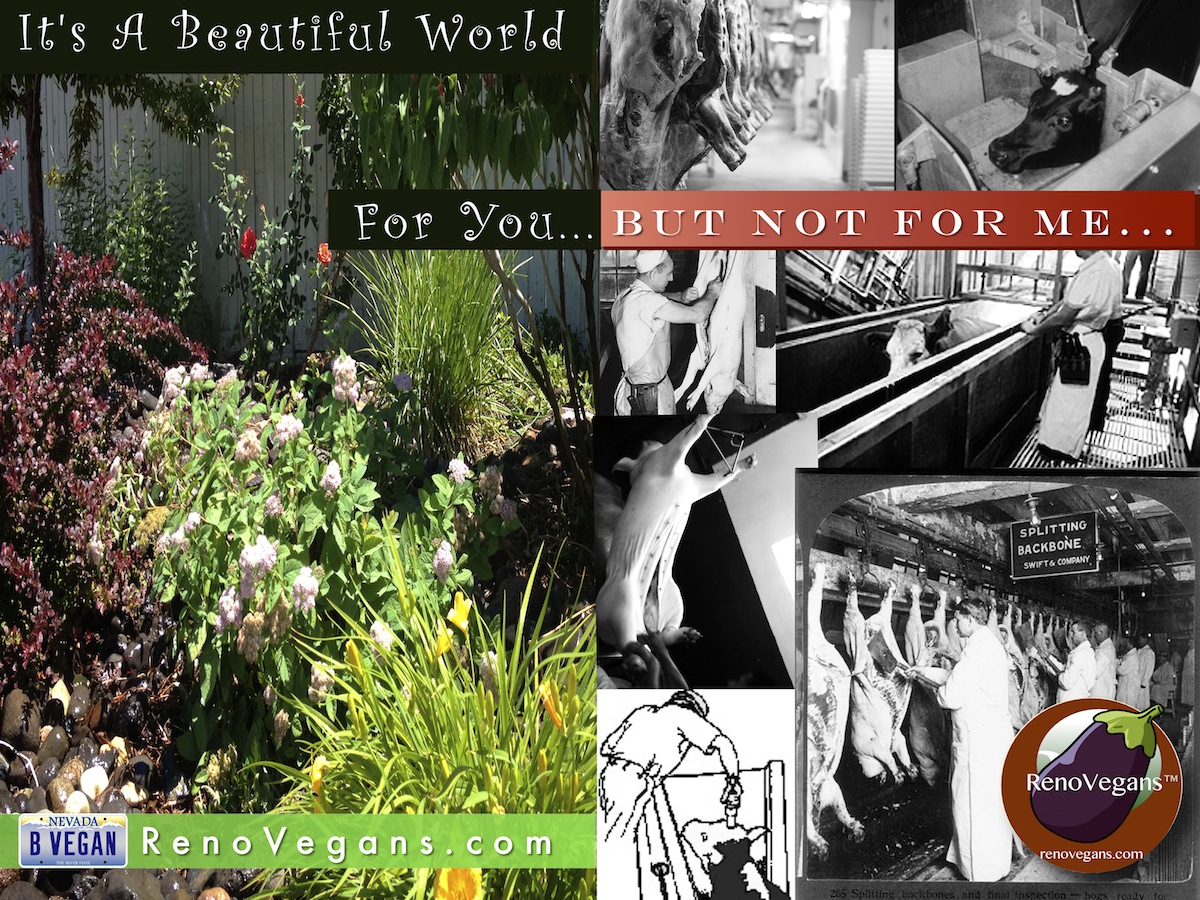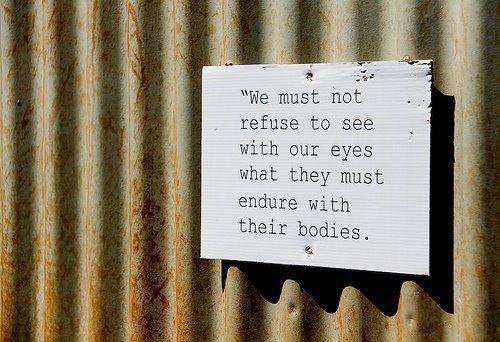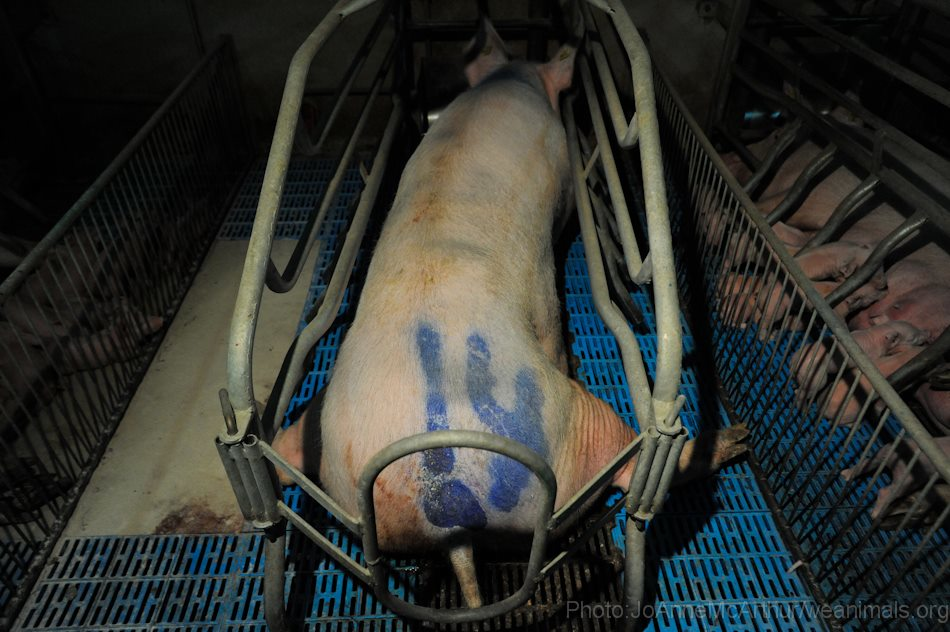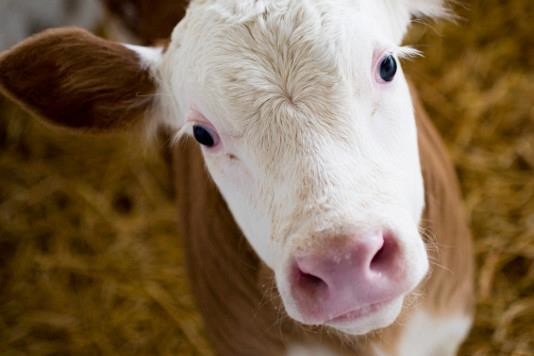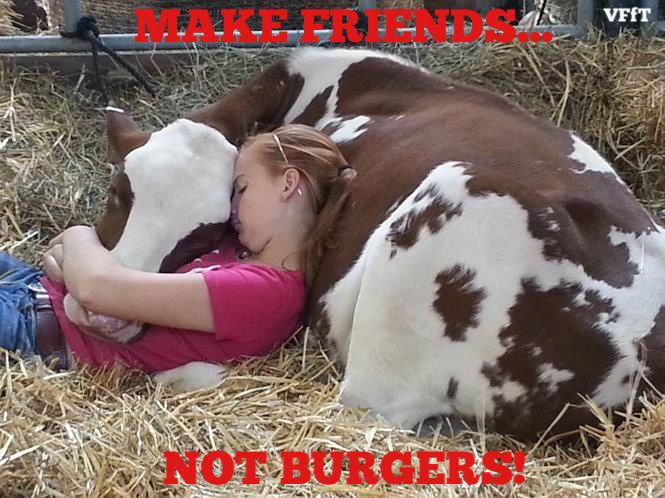 Reasons to Go Vegan #3: Abuse/Cruelty
Reasons to Go Vegan #3: Abuse/Cruelty
 Abuse/Cruelty
Abuse/Cruelty
 As long as people will shed the blood of innocent creatures there can be no peace, no liberty, no harmony between people. Slaughter and justice cannot dwell together.
As long as people will shed the blood of innocent creatures there can be no peace, no liberty, no harmony between people. Slaughter and justice cannot dwell together.
—Isaac Bashevis Singer
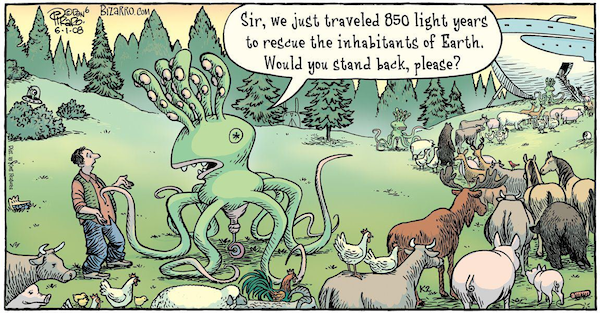
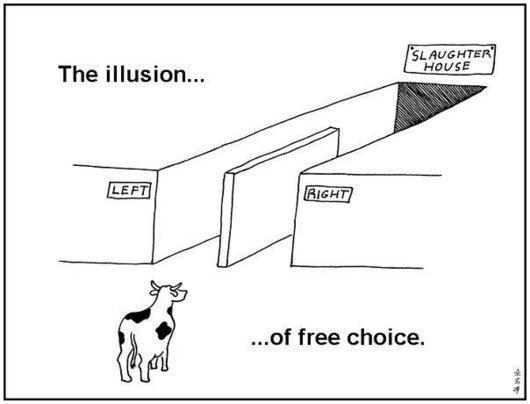 Factory Farming is the process of raising livestock in confinement at high stocking density, where a farm operates as a factory, a practice typical in industrial farming by agribusinesses. The main products of this industry are meat, milk and eggs for human consumption. However, there have been issues regarding whether factory farming is sustainable and ethical.
Factory Farming is the process of raising livestock in confinement at high stocking density, where a farm operates as a factory, a practice typical in industrial farming by agribusinesses. The main products of this industry are meat, milk and eggs for human consumption. However, there have been issues regarding whether factory farming is sustainable and ethical.
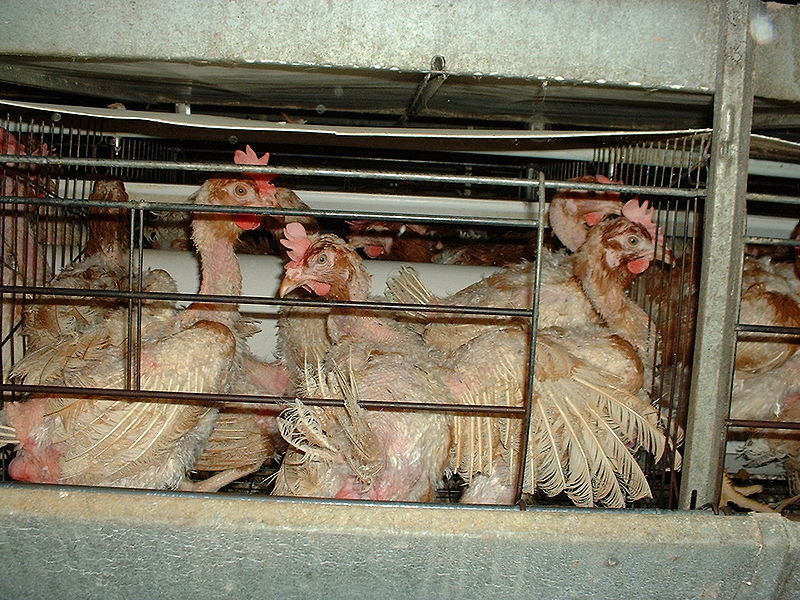 Confinement at high stocking density requires antibiotics and pesticides to mitigate the spread of disease and pestilence exacerbated by these crowded living conditions. In addition, antibiotics are used to stimulate livestock growth by killing intestinal bacteria. According to a February 2011 FDA report, nearly 29 million pounds of antimicrobials were sold in 2009 for both therapeutic and non-therapeutic use for all farm animal species. The Union of Concerned Scientists estimates that 70% of that amount is for non-therapeutic use.
Confinement at high stocking density requires antibiotics and pesticides to mitigate the spread of disease and pestilence exacerbated by these crowded living conditions. In addition, antibiotics are used to stimulate livestock growth by killing intestinal bacteria. According to a February 2011 FDA report, nearly 29 million pounds of antimicrobials were sold in 2009 for both therapeutic and non-therapeutic use for all farm animal species. The Union of Concerned Scientists estimates that 70% of that amount is for non-therapeutic use.
To get involved see our Animal Rights page.
- Close confinement systems (cages, crates) or lifetime confinement in indoor sheds
- Discomfort and injuries caused by inappropriate flooring and housing
- Restriction or prevention of normal exercise and most of natural foraging or exploratory behaviour
- Restriction or prevention of natural maternal nesting behaviour
- Lack of daylight or fresh air and poor air quality in animal sheds
- Social stress and injuries caused by overcrowding
- Health problems caused by extreme selective breeding and management for fast growth and high productivity
- Reduced lifetime (longevity) of breeding animals (dairy cows, breeding sows)
- Fast-spreading infections encouraged by crowding and stress in intensive conditions
- Debeaking (beak trimming or shortening) in the poultry and egg industry to avoid pecking in overcrowded quarters
- Forced and over feeding (by inserting tubes into the throats of ducks) in the production of foie gras

"A large calf ranch in Idaho USA, housing tens of thousands of calves. They are transferred as newborns and will stay in this confinement until they are old enough to be put in calf pens or transferred to feed yards or heifer facilities. The heifers will finish 'growing out' until they are old enough to go back to the dairy once again, and the steers are sold for human consumption." —The True Face of Dairy.
Click "You" to enter close confinement.
Articles
-
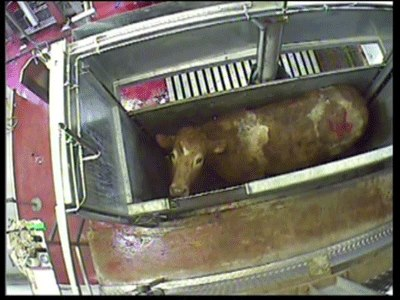 Animals are as with it as humans, scientists say —Discovery News
Animals are as with it as humans, scientists say —Discovery News
An international group of prominent scientists has signed The Cambridge Declaration on Consciousness in which they are proclaiming their support for the idea that animals are conscious and aware to the degree that humans are -- a list of animals that includes all mammals, birds, and even the octopus.
-
Abuse and Neglect —Humane Society of the US
Animal cruelty can be either deliberate abuse or simply the failure to take care of an animal. Either way, and whether the animal is a pet, a farm animal, or wildlife, the victim can suffer terribly.
All U.S. states have animal cruelty laws, and 47 states treat some forms of abuse as felonies. Farmers and researchers can do cruel things to animals that other people can't do legally, but all states have some protection for pets like dogs and cats. - National Pork Producers Council: Anti-Science & Anti-Animal
 More than 80 percent of the United States' 5.5 million breeding pigs are crammed into 2 foot by 7 foot crates, unable to engage in many of their most important natural behaviors. They're never able to turn around or even lie down comfortably—day and night, for their entire lives.
More than 80 percent of the United States' 5.5 million breeding pigs are crammed into 2 foot by 7 foot crates, unable to engage in many of their most important natural behaviors. They're never able to turn around or even lie down comfortably—day and night, for their entire lives.
The scientific consensus (nicely summarized here by the Humane Society of the United States) extensively documents that when pigs are immobilized in crates, they develop severe mental disorders from frustration and boredom, their muscles and bones waste away, and more.
The National Pork Producers Council (NPPC) summed up its anti-scientific and anti-animal views when, in attempting to defend the industry's confinement of mother pigs in cages so small the animals can't even turn around, NPPC communications director Dave Warner told the National Journal, "So our animals can't turn around for the 2.5 years that they are in the stalls producing piglets. I don't know who asked the sow if she wanted to turn around?"
When your own communications director makes a remark like that, you have an industry in crisis.
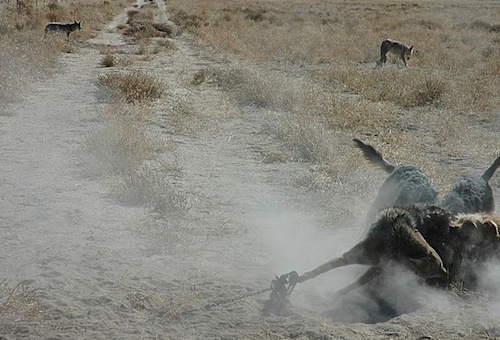
Three coyotes are caught in leg-hold traps in this photo from a Wildlife Services trapper. Leg-hold traps are used by the agency to capture and kill 10,000 to 14,000 animals a year. Roughly half are coyotes, but many other species are targeted, too, including bobcats, muskrats and wild pigs. The agency's traps, which are banned in many countries, have also captured and killed 4,000 non-target animals since 2006, including great-blue herons, mule deer and black bears. -Photo and caption, Sacramento Bee.
"Did you know that USDA "Wildlife Services" uses taxpayer dollars to kill about 5 million animals each year at the behest of private ranchers… Affected species include eagles, hawks, owls, vultures, foxes, mountain lions, river otters, badgers, gophers, [ravens,] and gray wolves. We can help bring this wasteful and needless slaughter to an end by ending our consumption of meat and dairy products."
—Don Robertson.
-
The killing agency: Wildlife Services' brutal methods leave a trail of animal death. Sacramento Bee, 4/2012
Since 2000, its employees have killed nearly a million coyotes, mostly in the West. They have destroyed millions of birds, from nonnative starlings to migratory shorebirds, along with a colorful menagerie of more than 300 other species, including black bears, beavers, porcupines, river otters, mountain lions and wolves.
And in most cases, they have officially revealed little or no detail about where the creatures were killed, or why. But a Bee investigation has found the agency's practices to be indiscriminate, at odds with science, inhumane and sometimes illegal. More… -
Congressmen call for investigation of Wildlife Services agency. Sacramento Bee, 5/2012
Two U.S congressmen — one a Republican, the other a Democrat — are calling for a congressional investigation of the federal government's wildlife damage control program.
"We have an agency that appears to be wasting federal dollars and actually causing harm while doing it, but yet perhaps covering up what they are doing and why. That's something Congress should investigate." More… -
Agriculture's Misnamed Agency, New York Times, 7/2013
There is a unit within the Agriculture Department's Animal and Plant Health Inspection Service called Wildlife Services. Its official mission, according to its Web site, is ?to resolve wildlife conflicts to allow people and wildlife to coexist.? This has meant, since 2000, some two million dead animals. The list includes coyotes, beavers, mountain lions, black bears and innumerable birds. The agency's real mission? To make life safer for livestock and game species. More…
-
Coyotes: the Media's Modern Bogeyman.
I am of course speaking of the coyote, Canis latrans, a species native to all states in our nation except Hawaii. We have crossed each other's paths for hundreds of years, and yet Homo sapiens are increasingly resistant to the idea that coyotes are an integral and permanent part of our shared wild landscapes. More…
See our Websites page for stores selling alternatives to leather and other animals skins.
Down and Feathers, Vegan Peace
The usual process to obtain the feathers is to first scald the birds in hot water for 1 to 3 minutes. Scalding isn't necessary, but makes it easier to remove the feathers. After that, the flight feathers are removed by hand. Next the body feathers and down are removed either by a plucking machine or by hand. The last step is to dry and sort the feathers.
Feather Removal from Live Birds
When feathers are plucked from birds, they are pulled out of their skins with force, leaving bleeding follicles and possible skin damage like tears and bruises. When non-ripe feathers are removed, they will often have tissue or blood attached to them. More…
FOIE GRAS
What is foie gras? —StopForceFeeding.com
Foie Gras: Delicacy of Despair
Actress Kate Winslet Narrates an Exposé on Foie Gras Production
Mercy For Animals' website and petition at Amazon Cruelty.
ARTICLES
ACTION
What is foie gras? —StopForceFeeding.com
Foie gras - French for "fatty liver" - is the diseased and enlarged liver of a duck or goose, produced through force feeding. The Animal Protection & Rescue League has investigated all three US foie gras farms and several in France and found rampant cruelty to be the norm. Compassion Over Killing sent an investigator to the largest US farm, Hudson Valley Foie Gras, on a guided tour with a hidden camera and also witnessed the standard cruelty that is required for foie gras production.
Two to three times a day, a worker grabs each bird, shoves a long, thick metal tube all the way down his throat, and an air pump shoots up to two pounds of corn mush into his esophagus. The industry always refers to the dry weight of the feed, which is about one pound per feeding. Adding oil and water doubles this weight, making it 20-30% of the bird's healthy body weight. Picture 30 one pound boxes of dry pasta and then add water. This is proportionally how much a 150 pound human would be force fed using this formula.
A duck's liver naturally weighs around 50 grams. However, to qualify as foie gras, the industry's own regulations require ducks' livers to weigh an absolute minimum of 300 grams.
The vast amounts of feed pumped down the ducks' throats causes enormous internal pressure, and the pipe sometimes punctures the esophagus, causing many to die from choking on the blood that fills their lungs. Some birds literally burst, choke to death on their own vomit, or become so weak that they are unable to fend off rats from eating them alive. More…
A PETA investigation at Hudson Valley Foie Gras in New York (then called "Commonwealth Enterprises") found that so many ducks died when their organs ruptured from overfeeding that workers who killed fewer than 50 birds per month were given a bonus. Many ducks develop foot infections, kidney necrosis, spleen damage, bruised and broken bills, and tumor-like lumps in their throats. One duck had a maggot-infested neck wound so severe that water spilled out of it when he drank.
Other investigations at Hudson Valley Foie Gras and America's other leading foie gras producer, Sonoma Foie Gras in California, revealed that ducks were crammed into filthy, feces-ridden sheds and that others were isolated in wire cages that were so small that they could barely move. Investigators also observed barrels full of dead ducks who had choked to death or whose organs had ruptured during the traumatic force-feeding process. The investigators rescued 15 ducks, including two who were being eaten alive by rats because they could not move. More…
Mercy For Animals' website and petition at Amazon Cruelty.
ARTICLES
-
California ban on foie gras to remain, court rules, The Guardian, 8/2013
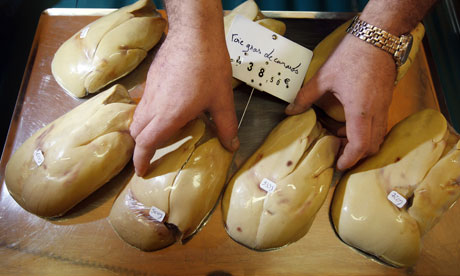 A federal appeals court has ruled California can keep in place its ban on selling foie gras.
A federal appeals court has ruled California can keep in place its ban on selling foie gras.
A Los Angeles court will still hear the case against the ban, but in its decision Friday, the ninth US circuit court of appeals expressed doubt opponents of the law would be successful.
The appeals court upheld a lower court ruling maintaining the ban while the case plays out.
The law bars state farmers from force-feeding ducks with a tube, the procedure used to produce foie gras. It also bans sales of the delicacy.
The legislature concluded tube-feeding ducks to engorge their livers is cruel. More…
ACTION
- Boycott these Reno restaurants that serve this dish borne of immeasurable suffering.
See more about Foie Gras on our Restaurant page.
Speciesism - A prejudice against members of different species.
Still not convinced? Listen to these.
For further in depth data
See our Resources pages including books, films, local restaurants and more.
Top ↑

 Your Health
Your Health Physiology
Physiology Dairy
Dairy The Planet
The Planet Pollution
Pollution Veal
Veal Palm Oil
Palm Oil Global Warming
Global Warming Animal Acts
Animal Acts The Ocean
The Ocean Slaughter
Slaughter Wool
Wool Lab Animals
Lab Animals